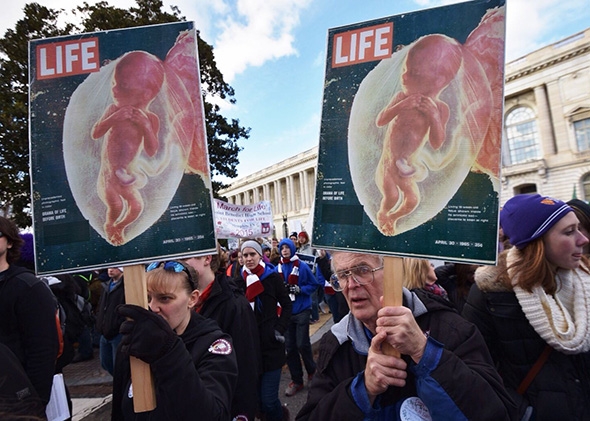Ireland’s Supreme Court on Wednesday cleared the way for an abortion referendum planned for the end of May, ruling that the unborn do not have inherent constitutional rights outside the right to life in the eighth amendment of the constitution.
The government in January proposed holding a referendum to liberalize the abortion regime at the end of May, offering voters the first opportunity in 35 years to overhaul some of the world’s strictest laws on the issue.
Before finalizing the exact wording and date of the referendum, Prime Minister Leo Varadkar had said it was prudent to wait for the Supreme Court judgment in a case the state was appealing.
The initial judgment related to an immigration case where a Nigerian man sought to revoke a 2008 deportation order in proceedings initiated eight years later on the basis that his Irish partner was at that time pregnant with their child.
The High Court ruled that the unborn enjoyed rights beyond the right to life set out in the eighth amendment that voters are due to be asked if they wish to repeal in the proposed referendum.
The state appealed the ruling, arguing the only right the unborn have is the right to be born and all other constitutional rights take effect at birth.
Ireland’s cabinet is due to meet on Thursday to discuss the ruling.
Ireland’s Supreme Court on Wednesday cleared the way for an abortion referendum planned for the end of May, ruling that the unborn do not have inherent constitutional rights outside the right to life in the eighth amendment of the constitution.
The government in January proposed holding a referendum to liberalize the abortion regime at the end of May, offering voters the first opportunity in 35 years to overhaul some of the world’s strictest laws on the issue.
Before finalizing the exact wording and date of the referendum, Prime Minister Leo Varadkar had said it was prudent to wait for the Supreme Court judgment in a case the state was appealing.
The initial judgment related to an immigration case where a Nigerian man sought to revoke a 2008 deportation order in proceedings initiated eight years later on the basis that his Irish partner was at that time pregnant with their child.
The High Court ruled that the unborn enjoyed rights beyond the right to life set out in the eighth amendment that voters are due to be asked if they wish to repeal in the proposed referendum.
The state appealed the ruling, arguing the only right the unborn have is the right to be born and all other constitutional rights take effect at birth.
Ireland’s cabinet is due to meet on Thursday to discuss the ruling.
Ireland’s Supreme Court on Wednesday cleared the way for an abortion referendum planned for the end of May, ruling that the unborn do not have inherent constitutional rights outside the right to life in the eighth amendment of the constitution.
The government in January proposed holding a referendum to liberalize the abortion regime at the end of May, offering voters the first opportunity in 35 years to overhaul some of the world’s strictest laws on the issue.
Before finalizing the exact wording and date of the referendum, Prime Minister Leo Varadkar had said it was prudent to wait for the Supreme Court judgment in a case the state was appealing.
The initial judgment related to an immigration case where a Nigerian man sought to revoke a 2008 deportation order in proceedings initiated eight years later on the basis that his Irish partner was at that time pregnant with their child.
The High Court ruled that the unborn enjoyed rights beyond the right to life set out in the eighth amendment that voters are due to be asked if they wish to repeal in the proposed referendum.
The state appealed the ruling, arguing the only right the unborn have is the right to be born and all other constitutional rights take effect at birth.
Ireland’s cabinet is due to meet on Thursday to discuss the ruling.
Ireland’s Supreme Court on Wednesday cleared the way for an abortion referendum planned for the end of May, ruling that the unborn do not have inherent constitutional rights outside the right to life in the eighth amendment of the constitution.
The government in January proposed holding a referendum to liberalize the abortion regime at the end of May, offering voters the first opportunity in 35 years to overhaul some of the world’s strictest laws on the issue.
Before finalizing the exact wording and date of the referendum, Prime Minister Leo Varadkar had said it was prudent to wait for the Supreme Court judgment in a case the state was appealing.
The initial judgment related to an immigration case where a Nigerian man sought to revoke a 2008 deportation order in proceedings initiated eight years later on the basis that his Irish partner was at that time pregnant with their child.
The High Court ruled that the unborn enjoyed rights beyond the right to life set out in the eighth amendment that voters are due to be asked if they wish to repeal in the proposed referendum.
The state appealed the ruling, arguing the only right the unborn have is the right to be born and all other constitutional rights take effect at birth.
Ireland’s cabinet is due to meet on Thursday to discuss the ruling.
Ireland’s Supreme Court on Wednesday cleared the way for an abortion referendum planned for the end of May, ruling that the unborn do not have inherent constitutional rights outside the right to life in the eighth amendment of the constitution.
The government in January proposed holding a referendum to liberalize the abortion regime at the end of May, offering voters the first opportunity in 35 years to overhaul some of the world’s strictest laws on the issue.
Before finalizing the exact wording and date of the referendum, Prime Minister Leo Varadkar had said it was prudent to wait for the Supreme Court judgment in a case the state was appealing.
The initial judgment related to an immigration case where a Nigerian man sought to revoke a 2008 deportation order in proceedings initiated eight years later on the basis that his Irish partner was at that time pregnant with their child.
The High Court ruled that the unborn enjoyed rights beyond the right to life set out in the eighth amendment that voters are due to be asked if they wish to repeal in the proposed referendum.
The state appealed the ruling, arguing the only right the unborn have is the right to be born and all other constitutional rights take effect at birth.
Ireland’s cabinet is due to meet on Thursday to discuss the ruling.
Ireland’s Supreme Court on Wednesday cleared the way for an abortion referendum planned for the end of May, ruling that the unborn do not have inherent constitutional rights outside the right to life in the eighth amendment of the constitution.
The government in January proposed holding a referendum to liberalize the abortion regime at the end of May, offering voters the first opportunity in 35 years to overhaul some of the world’s strictest laws on the issue.
Before finalizing the exact wording and date of the referendum, Prime Minister Leo Varadkar had said it was prudent to wait for the Supreme Court judgment in a case the state was appealing.
The initial judgment related to an immigration case where a Nigerian man sought to revoke a 2008 deportation order in proceedings initiated eight years later on the basis that his Irish partner was at that time pregnant with their child.
The High Court ruled that the unborn enjoyed rights beyond the right to life set out in the eighth amendment that voters are due to be asked if they wish to repeal in the proposed referendum.
The state appealed the ruling, arguing the only right the unborn have is the right to be born and all other constitutional rights take effect at birth.
Ireland’s cabinet is due to meet on Thursday to discuss the ruling.
Ireland’s Supreme Court on Wednesday cleared the way for an abortion referendum planned for the end of May, ruling that the unborn do not have inherent constitutional rights outside the right to life in the eighth amendment of the constitution.
The government in January proposed holding a referendum to liberalize the abortion regime at the end of May, offering voters the first opportunity in 35 years to overhaul some of the world’s strictest laws on the issue.
Before finalizing the exact wording and date of the referendum, Prime Minister Leo Varadkar had said it was prudent to wait for the Supreme Court judgment in a case the state was appealing.
The initial judgment related to an immigration case where a Nigerian man sought to revoke a 2008 deportation order in proceedings initiated eight years later on the basis that his Irish partner was at that time pregnant with their child.
The High Court ruled that the unborn enjoyed rights beyond the right to life set out in the eighth amendment that voters are due to be asked if they wish to repeal in the proposed referendum.
The state appealed the ruling, arguing the only right the unborn have is the right to be born and all other constitutional rights take effect at birth.
Ireland’s cabinet is due to meet on Thursday to discuss the ruling.
Ireland’s Supreme Court on Wednesday cleared the way for an abortion referendum planned for the end of May, ruling that the unborn do not have inherent constitutional rights outside the right to life in the eighth amendment of the constitution.
The government in January proposed holding a referendum to liberalize the abortion regime at the end of May, offering voters the first opportunity in 35 years to overhaul some of the world’s strictest laws on the issue.
Before finalizing the exact wording and date of the referendum, Prime Minister Leo Varadkar had said it was prudent to wait for the Supreme Court judgment in a case the state was appealing.
The initial judgment related to an immigration case where a Nigerian man sought to revoke a 2008 deportation order in proceedings initiated eight years later on the basis that his Irish partner was at that time pregnant with their child.
The High Court ruled that the unborn enjoyed rights beyond the right to life set out in the eighth amendment that voters are due to be asked if they wish to repeal in the proposed referendum.
The state appealed the ruling, arguing the only right the unborn have is the right to be born and all other constitutional rights take effect at birth.
Ireland’s cabinet is due to meet on Thursday to discuss the ruling.












